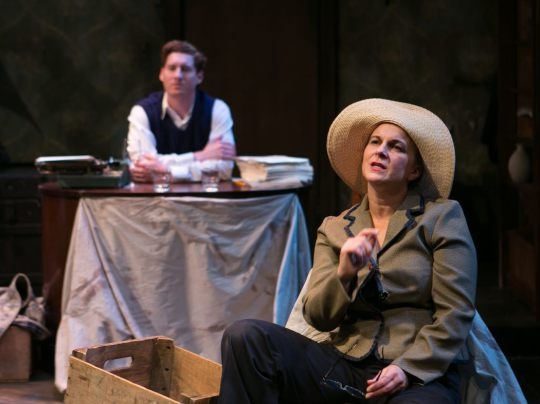Dear Elizabeth
Lyric Stage Company of Boston presents Sarah Ruhl’s play about two beloved poets.

(© Mark S. Howard)
Playwright Sarah Ruhl culled the dialogue for her two-hander Dear Elizabeth from the 30-year correspondence between the poets Elizabeth Bishop and Robert Lowell. Their relationship started in 1947 when the pair met at a party in New York, and it continued until Lowell's sudden death from a heart attack at the age of 60. They signed off their early letters with "Sincerely yours," progressing to "Affectionately," and finally, "With Love."
Ruhl's play is being presented as an elegiac memoir by Lyric Stage Company. A. Nora Long directs the work in mini-spectacle fashion, choosing to treat each letter as a separate scene, moving the actors around (and up and down) the two-level, rough-hewn chamber designed by Shelley Barish. At the set's center, echoing Bishop and Lowell's passion for writing on a page, is a tower of books that reaches from floor to ceiling, surrounded by bibelots fraught with meaning, strewn throughout the space. Now and then, a small trap in the floor opens to disclose a pool of water, recalling an idyllic weekend in Maine that the two poets spent together. One wonders if the cornucopia of words that flowed between Lowell and Bishop would be even more evocative of their friendship if it were staged without being decorated by props, set pieces, and projections of dates and places on the walls and floor.
Ruhl has been masterful in extracting the arc of a drama from the 800 pages of their correspondence in Words in Air: The Complete Correspondence Between Elizabeth Bishop and Robert Lowell. Watching the play makes one regret the "might have been" between them. The play follows the chronological trajectory of the letters, from the casual first encounter to the deepening connection between two souls. Their responses disclose the scars each of them carries, as well as the mutual elation for the prizes they have won. Their lives' pivotal moment comes when Lowell asks Bishop to marry him, and she demurs. The relationship that endured was a testament to the significance of a widely encompassing friendship that seemed to surpass a traditional romance. "Asking you is the might have been that is the one towering change, the other life that might have been," he later wrote. Lowell was known to carry a poem by Bishop in his wallet; they were affected by each other's opinions of their poems and often critiqued them before they were published.
Ed Hoopman portrays Lowell as a lost soul, stumbling into a world that occasionally overwhelms him. Hoopman is shy at the few times when he and Bishop come face-to-face. In contrast, Laura Latreille as Bishop seems more in charge, of her life and their friendship, despite her reliance on ever more frequent bouts of drinking.
It would be hard to imagine better actors in the roles than Hoopman as the needy Lowell, somewhat careless about other people's lives and feelings, and Laura Latreille as the fastidious Bishop, chastising her faithful correspondent when he recklessly mined a letter for material from Elizabeth Hardwick, one of his ex-wives. (Lowell was married three times. His first wife was the poet Jean Stafford.) Lowell shared the ups and downs of his personal experiences — for better and worse — with Bishop.
But for two poets who constructed lives within the constraints of written language, Dear Elizabeth is a fitting tribute to a friendship that thrived on the emotional sustenance of letters.










